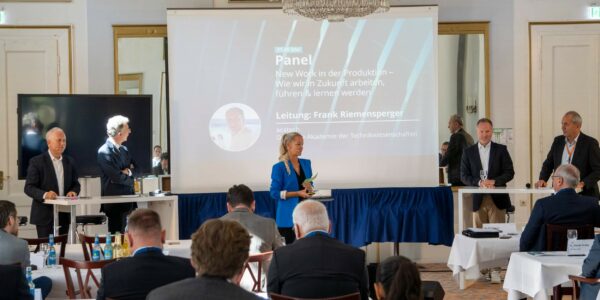
Com a introdução do ChatGPT, a inteligência artificial subiu ao palco para dar início à próxima rodada de digitalização, inclusive na produção. Esse é (ainda) um grande desafio para um grande número de indústrias de médio porte. É necessário ter uma visão e uma estratégia. O Staufen C-Day foi encorajador ao mostrar as aplicações em que a IA faz sentido e onde está o foco agora.

A IA está se tornando a próxima afronta à humanidade? Ela está ferindo nosso ego, já que é muito mais rápida, mais precisa e, acima de tudo, mais barata do que nós? Essa foi a pergunta provocativa feita pelo Prof. Marco Huber, do Instituto Fraunhofer de Engenharia de Manufatura e Automação IPA, em Stuttgart, na Alemanha. O potencial econômico da tecnologia é enorme, explica o cientista. Somente na Alemanha, prevê-se que a IA gerará um crescimento adicional no produto interno bruto de 430 bilhões de euros* até 2030.
As empresas do setor de manufatura estão prevendo principalmente custos mais baixos em armazenamento e áreas indiretas, menor tempo de colocação no mercado, melhor utilização da capacidade da fábrica e menos rejeições. Até o momento, prossegue Huber, houve pouquíssimas aplicações de IA na produção. Isso envolve, principalmente, o aprendizado de máquina, ou seja, o aprendizado a partir de padrões nos dados.
Machine learning na produção
Potential applications for machine learning in the production process include assessing the degree of wear of critical components or AI-assisted visual inspection, dramatically cutting down on manual re-inspection of electronic components. However, machine learning can also be used for configuring production systems. This is already a topic being discussed in many large companies. “Every machine has a large number of parameters that need to be configured for the production process to run as optimally as possible. This is something that people with a lot of experience do, but it will probably never be perfect,” said AI expert Huber. Using AI allows the development of “assistance systems” where employees are provided with suggested parameters based on production data, and the decision is ultimately made by the human operator. One even more far-reaching possibility, he said, is the autonomous optimization of machine parameters. He advised all executives considering the introduction of AI in their own companies to start with small, manageable projects. What is especially important: “Unless that data is good, you might as well not do the AI thing at all.”
Unless that data is good, you might as well not do the AI thing at all.
Prof. Marco Huber,
Fraunhofer Institute for Manufacturing Engineering and Automation IPA in Stuttgart, Germany
AI in the company requires a clear announcement from the top

Joachim Franz, Automotive Industry Lead at Microsoft Germany, spoke at C-Day, mentioning the new era that the industry was being confronted with. AI will influence all areas in value creation, not just in manufacturing. In manufacturing, the top application for AI is predictive maintenance, he said, because the technology helps prevent unwanted downtime. Predictive maintenance requires companies to consistently collect and store data from networked manufacturing facilities. By analyzing this data, errors, their causes, and potential patterns can be identified, says Franz. If deviations occur, employees are then automatically alerted to implement necessary maintenance actions either immediately or in a planned manner.
Just as Fraunhofer researcher Huber, Joachim Franz also emphasized that the basis for AI is a robust database. Implementing AI involves a multi-stage process that companies are advised to follow: “It all starts with a clear strategy. Because collecting all that data makes no sense, companies should focus on specific applications. “Start small and be agile in your approach”, the Microsoft manager advises. Moreover, data governance is enormously important, he added, i.e. establishing guidelines and standards, for example for the exchange of data across company boundaries or on the subject of sustainability. Joachim Franz: ” AI holds enormous potential, but its use has to be wanted ‘from the top’. This is why a C level announcement is needed to send the company on its way.”
*Study by PWC 2019



